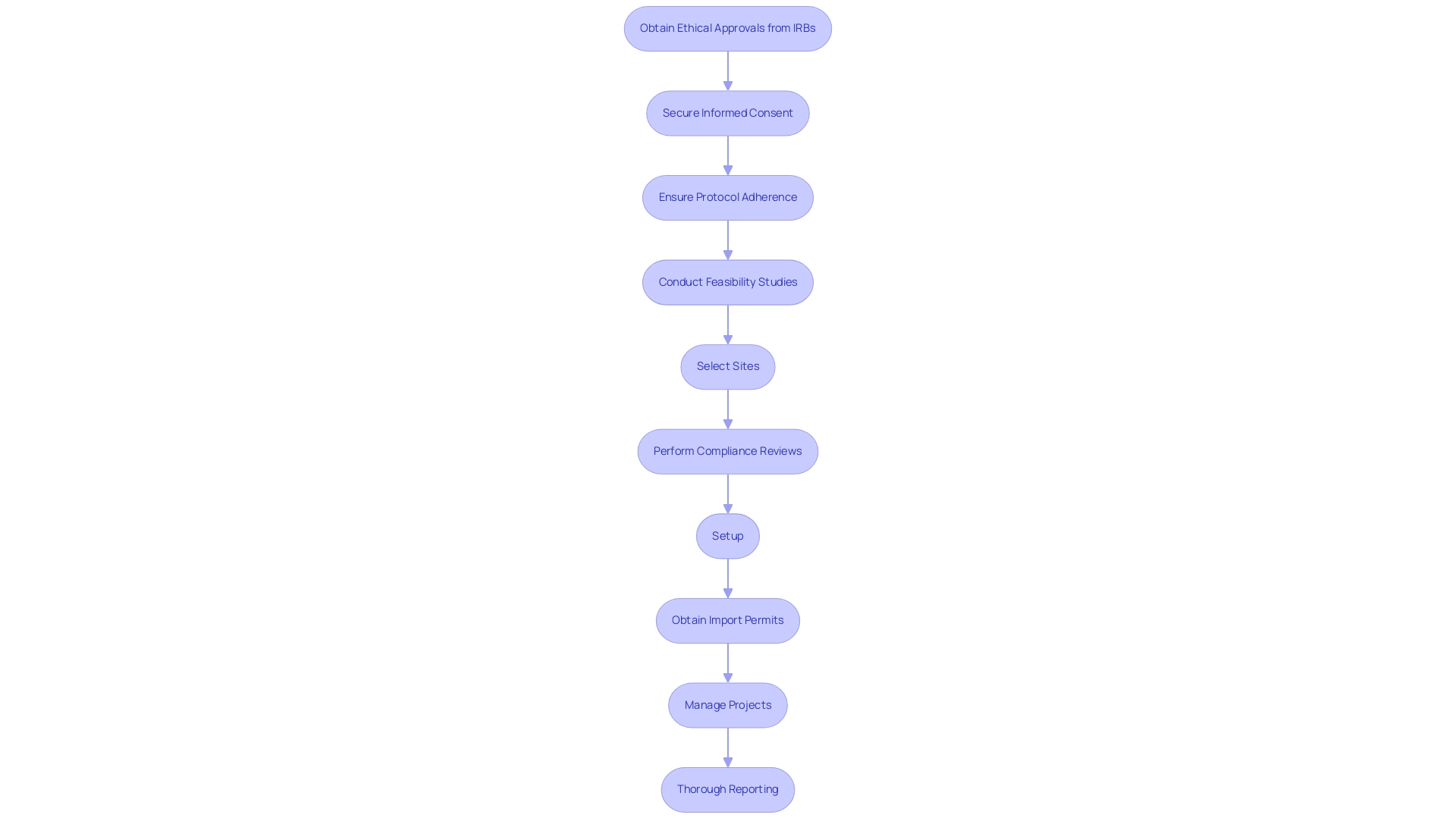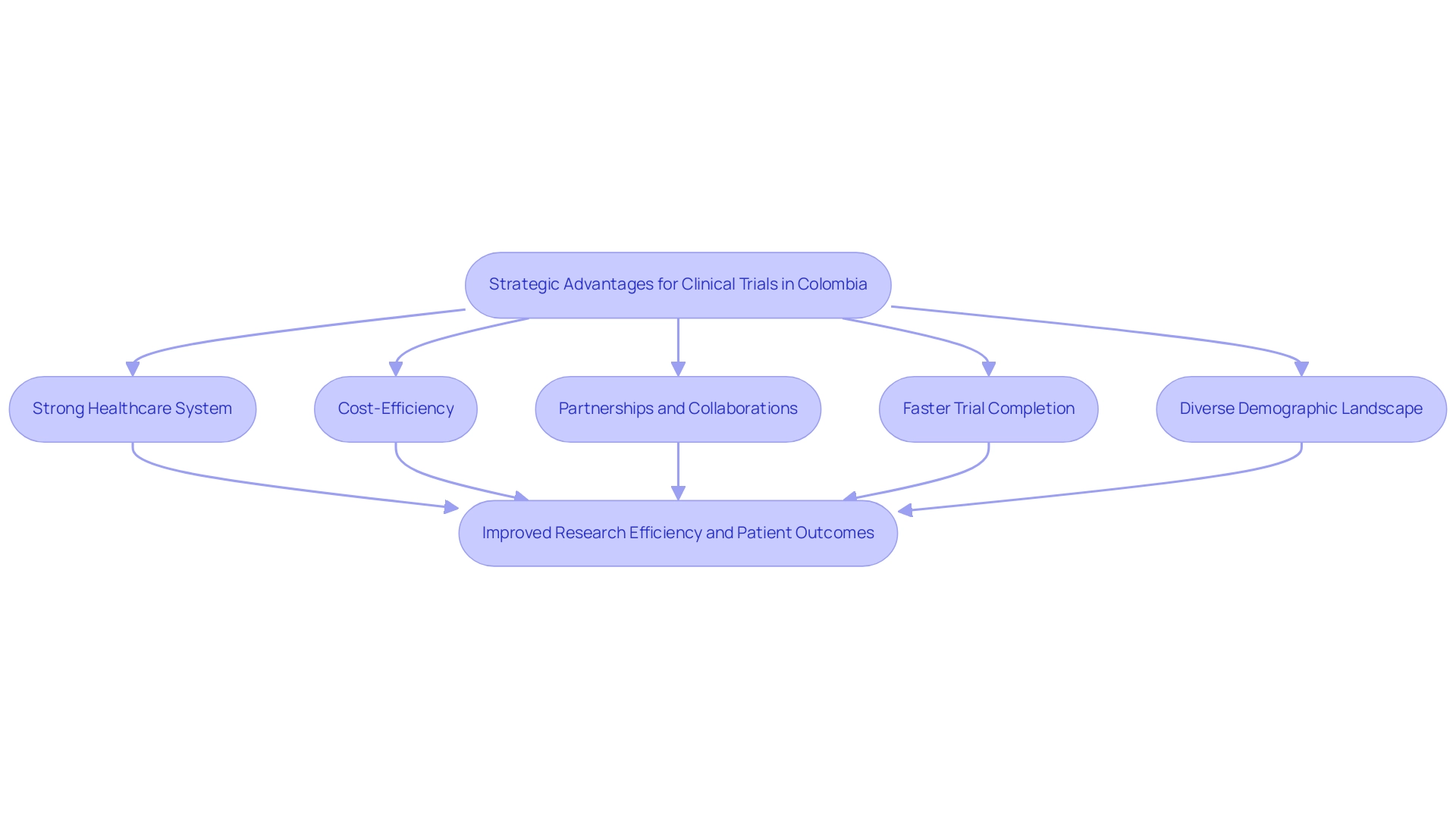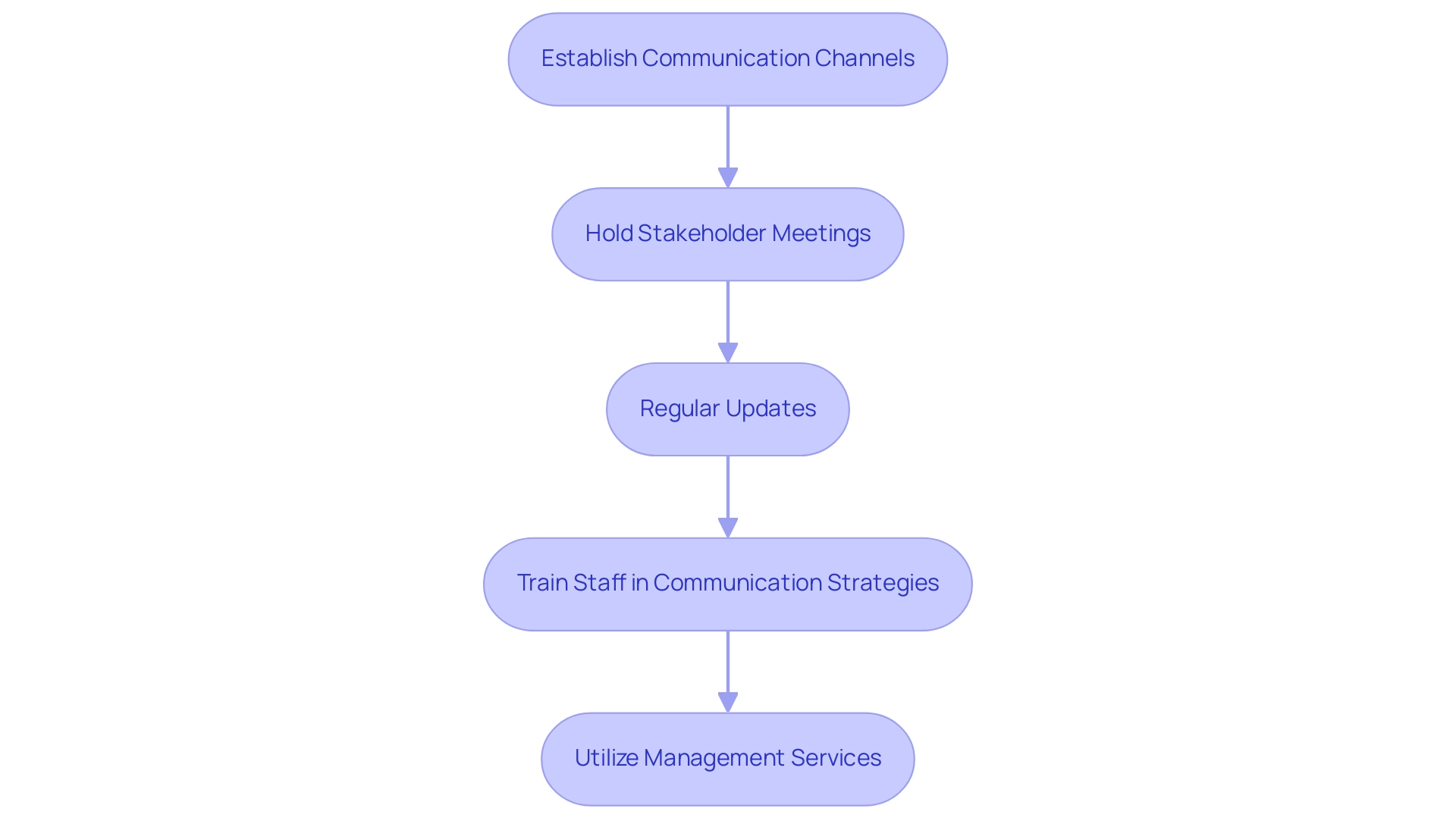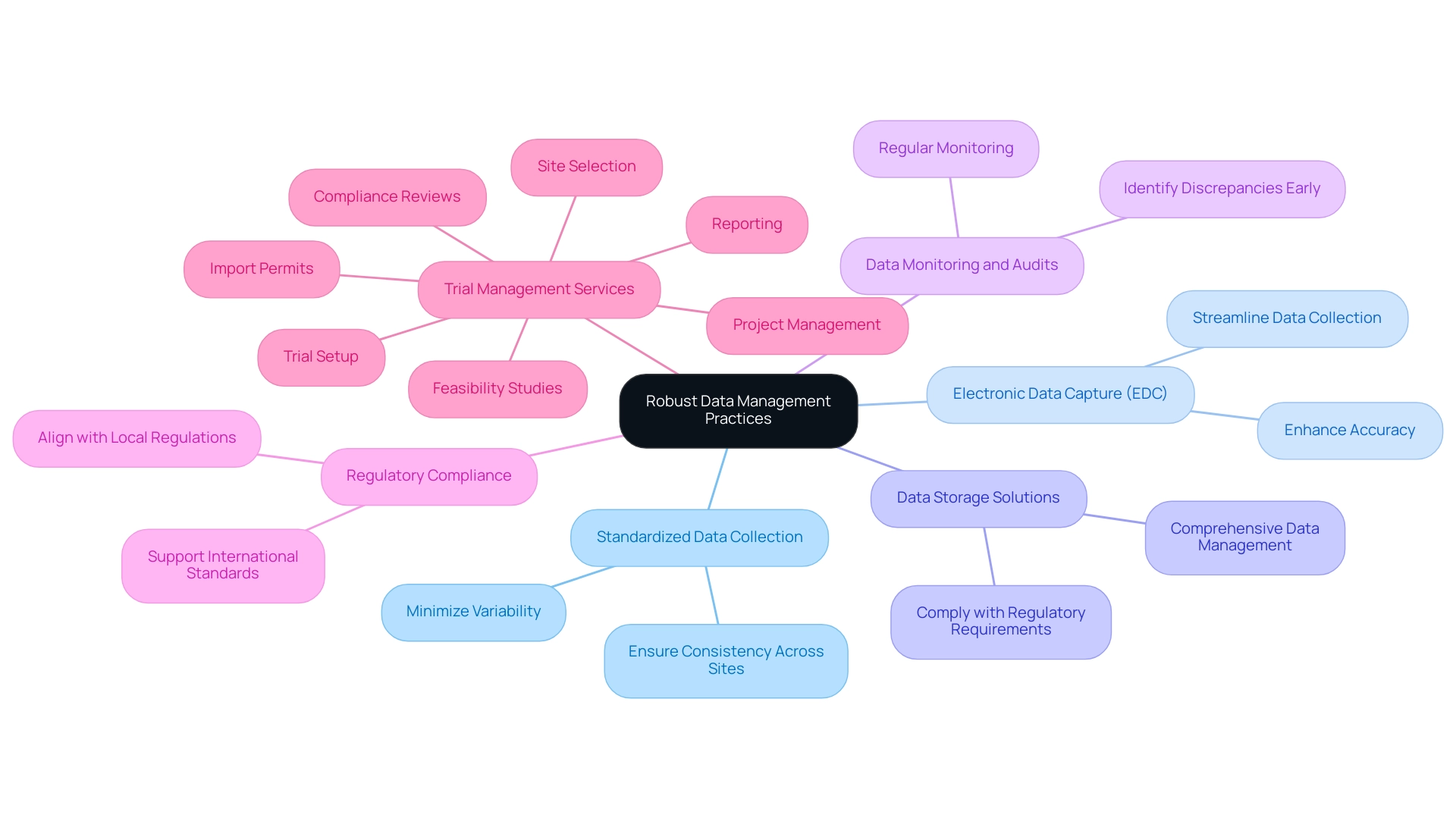Introduction
Colombia is rapidly emerging as a key player in the realm of clinical trials for medical devices, driven by a combination of robust regulatory frameworks and strategic advantages. The National Food and Drug Surveillance Institute (INVIMA) oversees a comprehensive set of regulations that ensure adherence to Good Clinical Practice (GCP) guidelines, creating a solid foundation for researchers. With a healthcare infrastructure that is both efficient and cost-effective, Colombia offers unique opportunities for accelerating clinical research while maintaining high standards of compliance.
As the landscape continues to evolve, understanding the intricacies of regulatory requirements and effective communication strategies becomes paramount for stakeholders aiming to navigate this dynamic environment successfully. This article delves into the essential components of conducting clinical trials in Colombia, highlighting best practices and the advantages that position the country as a preferred destination for innovative medical research.
Understanding the Regulatory Landscape for Medical Device Trials in Colombia
In Colombia, carrying out research studies for medical devices is regulated by a set of guidelines set forth by the National Food and Drug Surveillance Institute (INVIMA). INVIMA plays a critical role in ensuring compliance with the 'Good Clinical Practice' (GCP) guidelines and the requirements outlined in Law 100 of 1993, which establishes the framework for health services and research. Researchers must undertake key steps including:
- Obtaining necessary ethical approvals from Institutional Review Boards (IRBs)
- Securing informed consent from participants
- Ensuring strict adherence to the protocol
Furthermore, our comprehensive clinical study management services include:
- Detailed feasibility studies
- Careful site selection
- Rigorous compliance reviews
- Efficient setup
- Import permits
- Project management
- Thorough reporting to facilitate a smooth research process
It is essential to stay updated on any changes in regulations and emerging guidelines, as these can significantly impact the conduct of experiments. Non-compliance can lead to severe consequences, including:
- Delays in approval
- Financial penalties
- Reputational damage
Collaborating with local experts, such as Katherine Ruiz, a Regulatory Affairs expert with extensive experience in medical device and in vitro diagnostics regulation, as well as local legal advisors, can further enhance adherence to regulatory necessities, minimizing the risk of non-compliance and bolstering the credibility of the research.

Leveraging Colombia's Strategic Advantages for Successful Clinical Trials
This country offers numerous strategic benefits for carrying out research studies, rendering it a compelling choice for investigators and sponsors. The country has a strong healthcare system, with numerous hospitals and clinics skilled at handling research. A notable partnership between bioaccess™ and Caribbean Health Group seeks to establish Barranquilla as a leading location for medical studies in Latin America, strengthened by robust backing from the country's Minister of Health.
Furthermore, the cost-efficiency of carrying out experiments in that nation frequently exceeds that of numerous other countries, allowing sponsors to enhance their research budgets. In collaboration with bioaccess™, GlobalCare Clinical Trials has improved clinical study ambulatory services in the country, achieving over a 50% decrease in subject recruitment time and maintaining an impressive 95% retention rate.
Moreover, the varied demographic landscape of the country enables rapid subject recruitment, essential for meeting research timelines. Recent data indicates that trials in that country can be completed 30% faster than in other regions, thanks to streamlined processes and a cooperative regulatory environment.
By utilizing these benefits, researchers in the medical field can greatly improve the efficiency and effectiveness of their investigations, ultimately aiding in better patient outcomes and furthering medical understanding. Significantly, PAVmed's successful first-in-human implantations of its PortIO™ Intraosseous Infusion System in Barranquilla demonstrate the potential for innovative medical trials in the region, further establishing Colombia's status as a leader in research.

Ensuring Effective Communication with Stakeholders
Successful clinical studies hinge on effective communication with all stakeholders involved. Researchers should establish clear channels of communication with regulatory bodies like INVIMA, ethics committees, and participants from the outset. Regular updates on trial progress and addressing any concerns promptly can help build trust and maintain transparency.
- Holding stakeholder meetings at key milestones promotes collaboration and guarantees alignment on project objectives.
- Additionally, training staff in effective communication strategies enhances interactions with participants, ensuring informed consent is obtained properly and that any questions or concerns are addressed.
By prioritizing communication, researchers can create a collaborative environment conducive to successful results. Moreover, taking into account the intricacies of medical studies, utilizing extensive management services for these studies—including feasibility assessments, site selection, compliance evaluations, project oversight, and reporting—is crucial for addressing regulatory challenges and enhancing study efficiency.
These services directly tackle common challenges encountered by medical device startups, such as regulatory hurdles, competition, and recruitment issues, ultimately aiding the successful progression of medical device evaluations.

Implementing Robust Data Management Practices
Implementing strong data management practices is crucial for ensuring the integrity and reliability of medical studies. Researchers should establish standardized data collection protocols to minimize variability and ensure consistency across sites. Utilizing electronic data capture (EDC) systems can streamline data collection and enhance accuracy. Additionally, maintaining comprehensive data storage solutions that comply with regulatory requirements is crucial. Regular data monitoring and audits should be conducted to identify any discrepancies or issues early in the process. By prioritizing data management, researchers can enhance the accuracy of their findings and support compliance with both local and international regulations.
Our trial management services encompass:
- Feasibility studies
- Site selection
- Compliance reviews
- Trial setup
- Import permits
- Project management
- Reporting
In Colombia, INVIMA (National Food and Drug Surveillance Institute) plays a pivotal role in regulating health products, ensuring compliance with health standards, and overseeing medical devices. Recognized as a Level 4 health authority by PAHO/WHO, INVIMA's rigorous oversight ensures that our services align with regulatory requirements, ultimately enhancing the quality and reliability of clinical research.

Conclusion
Colombia's emergence as a key player in the field of clinical trials for medical devices is underpinned by its robust regulatory framework and strategic advantages. The oversight provided by INVIMA ensures that researchers adhere to Good Clinical Practice guidelines, while the country’s efficient healthcare infrastructure and cost-effectiveness present unique opportunities for conducting high-quality research. Key steps such as obtaining ethical approvals and maintaining compliance are crucial for the successful execution of trials, highlighting the importance of staying informed about regulatory changes.
Moreover, Colombia's collaborative efforts, such as partnerships between local organizations and international entities, enhance the potential for successful clinical trials. The ability to complete trials faster and with higher retention rates not only optimizes research budgets but also contributes to improved patient outcomes and advancements in medical knowledge. The diverse demographic landscape further facilitates subject recruitment, making Colombia an attractive destination for innovative clinical studies.
Effective communication with stakeholders is vital throughout the trial process. Establishing clear channels of communication fosters trust and transparency, while robust data management practices ensure the integrity and reliability of research findings. By prioritizing these elements, researchers can navigate the complexities of clinical trials with greater ease and confidence.
In conclusion, Colombia stands out as a leading destination for conducting clinical trials, offering a combination of regulatory support, strategic advantages, and a commitment to high standards of research. By leveraging these strengths and adhering to best practices, stakeholders can significantly enhance the efficiency and effectiveness of their clinical studies, ultimately driving forward the field of medical innovation.




